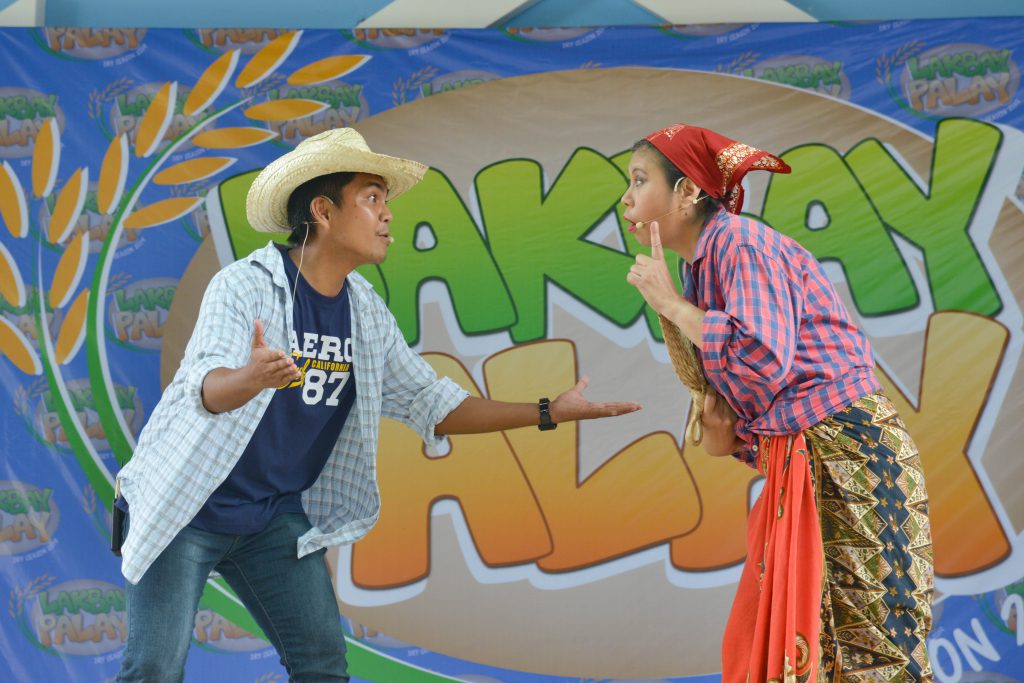
Filipinos love entertainment; noted in the world for singing and joking even when faced with adversaries. As the country fulfills its commitment to the World Trade Organization (WTO), Philippine Rice Research Institute stirred awareness on Rice Tariffication Law (RA 11203) through theater play. In an attempt to create conversation with farmers during its recent Lakbay Palay, it stimulated not only the emotions but also the natural curiosity of a typical Filipino farmer.
Through a dialogue between two characters, the ten-minute informance presented the timeline of Philippine’s agreement with the WTO starting 1995 to present. The characters also emphasized solutions offered by the law under the tariffication regime.
The narrative
Ang unang kwento.
Unang kwento ng pag-ibig at pangako.
Kwento ng pagmamahal at pangako
Mga magulang na mahal ang anak,
gumagawa ng pangako sa sarili
Upang sila sa tunay na hamon ng buhay ay maigayak
In 1995, Philippines joined General Agreement of Tariffs and Trade (GATT), which opened WTO member countries’ market to foreign goods by lifting quantitative restrictions (QR) and levying tariff or tax instead. In response, Agricultural Tariffication Act of 1996 (RA 8178) was ratified to impose tariff on all imported agricultural products except rice.
Philippines asked and was granted a ten-year exemption to rice tariffs due to the commodity’s economic importance. Such exemption was expected to protect the local rice economy and prepare the farmers (link website article) PhilRice readies for rice tariff act) to be more competitive by the time QR would have been lifted. Two more extensions were given until the country reached an ultimatum June 30 last year. Today, the Philippines has to set tariff or tax in lieu of QR.
Imported rice permeation is anticipated to drop the market prices of milled rice because top rice exporters can offer lower prices owing to low production cost. However, this could possibly leave the rice farmers on the uncertain side of the spectrum.
Ikalawang kwento.
Ito ay kwento ng magulang.
Nanay o tatay na gustong masiguro ang kinabukasan ng kanyang anak.
Gaya ng lahat ng magulang, gusto masiguro na hindi mahihirapan ang anak.
Gaya ng ibang mga magulang, sinisiguro na matutulungan ang anak.
Ang batas na ito ay isang magulang.
Ang magsasaka ang kanyang anak.
Minimithi na mapataas pa rin ang ani
Sinisiguro na walang lugi
To cushion the foreseen effects of this change on farmers, RA 11203 included the Rice Competitiveness Enhancement Fund to support rice seed research, machines subsidy, as well as capacity enhancement programs and improved credit access for farmers.
Help for farmers
Ang taripa ang poprotekta sa mga magsasaka.
Taripa na kinolekta sa kung sino man ang mag-aangkat ng bigas
Mula sa ibang bansa
Taripa na sisigurong hindi pa rin talo ang presyo ng palay
Na tanim ng magsasaka
Taripa na gagamitin para mas makatulong
Mapaganda ang kita ng magsasaka
Paano?
10 billion. 10 billion kada taon.
10 billion ang pamamahalaan para sa mga magsasaka.
Key agencies including the DA Regional Field Office 3, Agricultural Training Institute, Department of Finance, Bureau of Plant Industry-National Seed Quality Control Services, Regional Crop Protection Center, Philippine Center for Postharvest Development and Mechanization, Landbank of the Philippines, Philippine Crop Insurance Corporation, and National Food Authority explained their role as stipulated in the law.
Hati-hati.
Limang bilyon para sa makinarya.
Tatlong bilyon para sa mataas na kalidad ng binhi.
Isang bilyon para sa pagpapautang.
Isang bilyon para sa pagsasanay at paghahasa ng magsasaka.
The audience were also encouraged to support the farmers.
Ang mahalaga. Sa imported, huwag magpabahala.
Bumili ng lokal na bigas upang matulungan lokal na magsasaka.
Dr. Diadem Gonzales-Esmero, PhilRice Community Relation Office head, led the production. The team comprised Lynette Grace Bibal (director), Floper Gershwin Manuel (scriptwriter), Perry Irish Duran (narrator/musical score), Crisaldo Maniquis (young farmer), and Lea Abaoag (old farmer).




